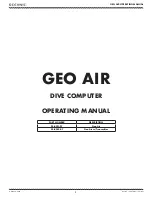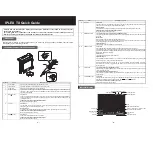
PIM Site Analyzer
α
Manual
© Rosenberger 2017 -
www.rosenberger.com/pia
Page 9 of 54
•
Cells and batteries must not be exposed to any mechanical shocks that are stronger than permitted.
•
If a cell develops a leak, the fluid must not be allowed to come into contact with the skin or eyes. If
contact occurs, wash the affected area with plenty of water and seek medical aid.
•
Improperly replacing or charging cells or batteries that contain alkaline electrolytes (e.g. lithium cells)
can cause explosions. Replace cells or batteries only with the matching Rosenberger type (see bill of
materials) in order to ensure the safety of the product.
•
Cells and batteries must be recycled and kept separate from residual waste. Rechargeable batteries
and normal batteries that contain lead, mercury or cadmium are hazardous waste. Observe the
national regulations regarding waste disposal and recycling.
Transport
•
The product may be very heavy. Therefore, the product must be handled with care. In some cases,
the user may require a suitable means of lifting or moving the product (e.g. with a lift-truck) to avoid
back or other physical injuries.
•
The user is responsible for securely fastening the products to or on the means of transport or lifting.
Observe the safety regulations of the manufacturer of the means of transport or lifting. Non-
compliance can result in personal injury or material damage.
•
If you use the product in a vehicle, it is the sole responsibility of the driver to drive the vehicle safely
and properly. The manufacturer assumes no responsibility for accidents or collisions. Never use the
product in a moving vehicle if doing so could distract the driver of the vehicle. Adequately secure the
product in the vehicle to prevent injuries or other damage in the event of an accident.
•
Transportation of Lithium batteries
Lithium batteries as well as devices containing such batteries are classified as dangerous goods
class 9 by the legislative authorities and therefore are subject to special regulations of load- securing
and transportation. Regardless the type of battery, damage and contact with water or air moisture
can cause heavy chemical reactions. Additionally, a short- circuit may cause a fire hazard.
Employees who pack and ship Lithium batteries and devices equipped with batteries, have to be
trained in compliance with the regulations: “The European Agreement Concerning the International
Carriage of Dangerous Goods by Road” applies for the European traffic, and the “International
Maritime Dangerous Goods Code” applies for the maritime traffic.
•
Disposal of Lithium batteries
You purchased a battery-operated product. The service life of the battery is quite long, but one day it
needs to be disposed. Used batteries are not allowed to be dumped in the household garbage.
Consumers are legally obligated to bring batteries to a suitable collection point in stores or the
community. Used batteries may contain hazardous substances or heavy metals that may damage
the environment and health. Batteries will be recycled; they contain important raw materials like iron,
zinc, manganese or nickel. The environment and Rosenberger say Thank You.










































